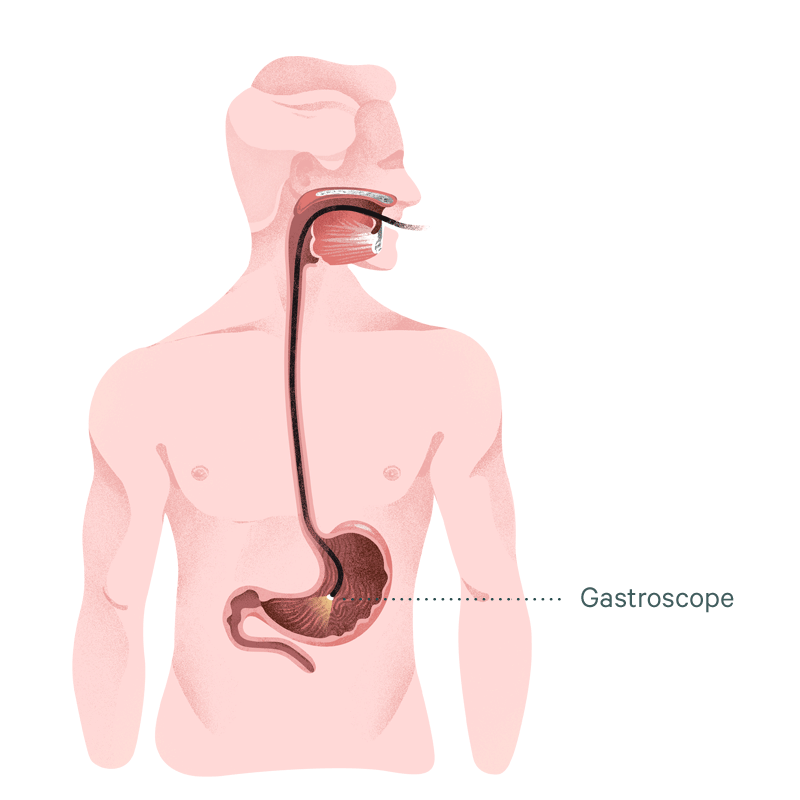Gastroscopy and Colonoscopy
What are Gastroscopy and Colonoscopy?
Gastroscopy and colonoscopy involve seeing the inside of your intestines with a specialised long flexible camera. This camera will allow your doctor to see, biopsy (sample) any abnormal tissue, take photos and remove any growths. Whilst CT scans and x-rays can see the outside of your intestines, the gastroscopy and colonoscopy can see the inside of your intestines with great detail.

Are gastroscopy and colonoscopy suitable for me?
Most people are suitable for a gastroscopy and colonoscopy. If you have symptoms such as acid reflux, unexplained abdominal pain, persistent diarrhea, change in bowel habits, or bleeding, you should consult your doctor on whether a gastroscopy
and/or colonoscopy is appropriate for you.
What does the operation involve?
A gastroscopy and colonoscopy are performed as a day procedure, most commonly under sedation (not a general anaesthetic). You will need to be fasted before the procedure and in the case of a colonoscopy, you will need to take a special preparation which will clean the inside of your bowel so that a clear image can be seen. Short acting anaesthetic is used for the procedure to ensure a speedy recovery and same day discharge.
How soon will I recover?
Most gastroscopy and colonoscopy cases are day procedures – you go home shortly after the procedure. You will need to arrange for someone to pick you up, as you will be unable to drive that same day. You may experience some gas bloating, however this only lasts for a few hours and should be completely gone by the end of the day.
What are the benefits of Gastroscopy and Colonoscopy?
Gastroscopy and colonoscopy is a safe, reliable, and effective methods of seeing your intestines. They are used for both diagnostic (making a medical diagnosis) and therapeutic (potentially treating any abnormalities that are found) purposes. It can help assess the severity and treat reflux disease. Colonoscopy for bowel cancer screening is very important as is investigating new or concerning symptoms regarding the gastrointestinal tract.
What complications can happen?
— Perforation of the intestine – this occurs in roughly
1 in 1000 cases performed.
— Bleeding requiring a blood transfusion – risk of 1 in 1000 cases performed.
— Risk of missing an advanced adenoma – can occur in 1 of 300 cases performed.
What are Gastroscopy and Colonoscopy?
Gastroscopy and colonoscopy involve seeing the inside of your intestines with a specialised long flexible camera. This camera will allow your doctor to see, biopsy (sample) any abnormal tissue, take photos and remove any growths. Whilst CT scans and x-rays can see the outside of your intestines, the gastroscopy and colonoscopy can see the inside of your intestines with great detail.

Are gastroscopy and colonoscopy suitable for me?
Most people are suitable for a gastroscopy and colonoscopy. If you have symptoms such as acid reflux, unexplained abdominal pain, persistent diarrhea, change in bowel habits, or bleeding, you should consult your doctor on whether a gastroscopy
and/or colonoscopy is appropriate for you.
What does the operation involve?
A gastroscopy and colonoscopy are performed as a day procedure, most commonly under sedation (not a general anaesthetic). You will need to be fasted before the procedure and in the case of a colonoscopy, you will need to take a special preparation which will clean the inside of your bowel so that a clear image can be seen. Short acting anaesthetic is used for the procedure to ensure a speedy recovery and same day discharge.
How soon will I recover?
Most gastroscopy and colonoscopy cases are day procedures – you go home shortly after the procedure. You will need to arrange for someone to pick you up, as you will be unable to drive that same day. You may experience some gas bloating, however this only lasts for a few hours and should be completely gone by the end of the day.
What are the benefits of Gastroscopy and Colonoscopy?
Gastroscopy and colonoscopy is a safe, reliable, and effective methods of seeing your intestines. They are used for both diagnostic (making a medical diagnosis) and therapeutic (potentially treating any abnormalities that are found) purposes. It can help assess the severity and treat reflux disease. Colonoscopy for bowel cancer screening is very important as is investigating new or concerning symptoms regarding the gastrointestinal tract.
What complications can happen?
— Perforation of the intestine – this occurs in roughly
1 in 1000 cases performed.
— Bleeding requiring a blood transfusion – risk of 1 in 1000 cases performed.
— Risk of missing an advanced adenoma – can occur in 1 of 300 cases performed.